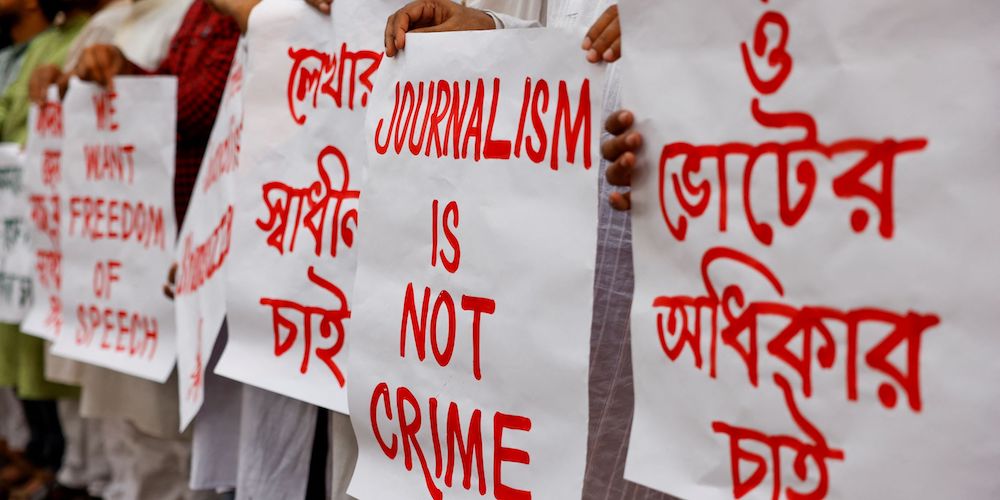Journalism under siege in Bangladesh: How Muhammad Yunus is building a Taliban-style regime

Turkey’s Recep Tayyip Erdoğan is infamous for turning his country into one of the world’s largest prisons for journalists. Today, Bangladesh – once celebrated as a rising democracy – is following the same path under the unelected, military-backed rule of Nobel laureate Muhammad Yunus. Since an Islamist-backed coup in 2024 brought Yunus to power, the country has witnessed an alarming surge in arrests, attacks, and intimidation of journalists.
This is not just a Bangladeshi problem. It is a crisis with far-reaching consequences for democracy, press freedom, and regional security. If left unchecked, Bangladesh could become the next Taliban-style state -destabilizing South Asia and threatening US and Indian strategic interests.
Journalists under siege
According to the International Journalists’ Network, more than 350 journalists have been harassed, 74 assaulted, and over 100 charged under fabricated cases since Yunus took power. Press credentials have been revoked for at least 167 reporters. These figures represent not isolated incidents, but a systematic effort to crush independent journalism.
The government dismisses these findings as “misinformation”. Yet the evidence is overwhelming. Committee to Protect Journalists (CPJ) coordinator Beh Lih Yi warned: “These assaults on press freedom must end. They create a chilling effect on the media”.
The chilling effect is precisely the point. By criminalizing reporters, Yunus’s regime is dismantling one of democracy’s most essential safeguards.
The Case of Monjurul Alam Panna
The ordeal of journalist Monjurul Alam Panna shows the brutality of this repression. On August 28, 2025, he was arrested during a discussion on Bangladesh’s constitution at the Dhaka Reporters Unity. A day later, he was brought to court in a bulletproof vest and helmet, as though he were a terrorist. On September 4, shocking images surfaced of police choking him inside the courtroom itself.
International media groups, legal experts, and human rights defenders have condemned the charges against Panna as fabricated. Yet he remains behind bars, a chilling reminder to every journalist of the price of dissent.
Extremists thrive in the shadows
While journalists are jailed, Islamist extremists are emboldened. Ansar al-Islam, the Bangladeshi affiliate of Al-Qaeda, openly justifies the killing of secular bloggers. In July, Islami Andolan Bangladesh declared its intention to model the nation after Taliban-ruled Afghanistan. Yunus’s political ally Jamaat-e-Islami continues to push for the same vision, ensuring that Islamist forces remain at the heart of power.
This paradox – silencing journalists while tolerating extremists – exposes the regime’s true agenda: consolidating power by dismantling democracy and enabling radicalism.

The global stakes
The crackdown has drawn condemnation from Amnesty International, Human Rights Watch, PEN America, and others, who warn that Bangladesh’s history of repressing free expression is reaching a dangerous peak. But the silence of the world’s leading democracies is striking.
For the United States, this is not simply a moral issue. Bangladesh is strategically positioned at the Bay of Bengal, a key front in the Indo-Pacific competition. If it descends into Islamist authoritarianism, Washington’s regional strategy will be gravely undermined. Bangladesh could become a safe haven for extremists with transnational ambitions, destabilizing South Asia and endangering US interests.
For India, the risks are immediate. Bangladesh’s long border with northeastern India has historically been exploited by militants. A Taliban-modeled Dhaka would open new channels for extremism, threatening Assam, West Bengal, and Tripura. Decades of Indian investment in connectivity, trade, and counterterrorism cooperation would collapse under the weight of an Islamist resurgence.
The fate of Bangladesh is therefore not an isolated national crisis – it is a direct threat to the stability of South Asia and to US-India strategic interests.
Democracy at the breaking point
Yunus has promised elections in February 2026, but his Islamist allies are already signaling their intention to sabotage them. With the press silenced, there is little hope of a free and fair vote. Democracy in Bangladesh is on life support, and its survival depends on international action.
If the current trajectory continues, Bangladesh risks becoming another Afghanistan: a country where journalists are criminalized, extremism flourishes, and democracy disappears.
The world must not remain silent as Muhammad Yunus turns Bangladesh into a prison for journalists and a breeding ground for extremism. Every day that Monjurul Alam Panna and his colleagues remain behind bars, democracy in Bangladesh slips further away.
The United States, India, and the broader democratic world must act now – by pressuring Dhaka, defending press freedom, and standing with those risking their lives for truth. Journalism is not a crime, and journalists are not criminals. If the world fails to act, Bangladesh’s descent into darkness will not stop at its borders. It will destabilize an entire region.
(Salah Uddin Shoaib Choudhury is an award-winning journalist, writer, and Editor of the newspaper Blitz. He specializes in counterterrorism and regional geopolitics. Follow him on X: @Salah_Shoaib)


